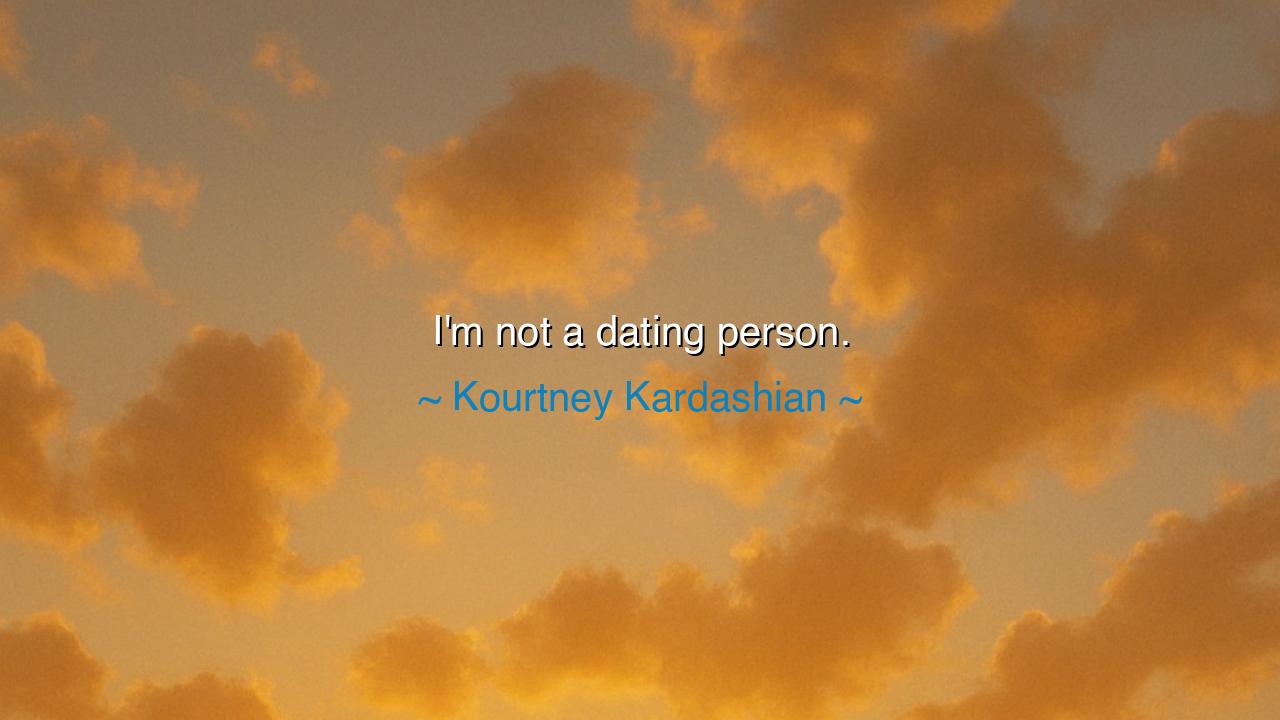
I'm not a dating person.






When a public figure says, “**I’m not a dating person,” the words land like a small stone that ripples a vast lake. The phrase is spare, but it carries a quiet rebellion against the carousel of casual romance and the culture that treats companionship like a marketplace. Spoken by Kourtney Kardashian, it reads as a boundary drawn in clear ink: a choice to step off the stage of serial pursuit and to ground the heart elsewhere—family, craft, faith, or simple solitude that makes room for depth. It is a refusal to be measured by how many first dinners become second; it is a pledge to value presence over performance.
To say, “**I’m not a dating person,” is not to scorn love; it is to question the ritual by which love is commonly sought. The ancients would hear in it the voice of temperance, a virtue that does not withhold joy but orders it. Many seek validation in the bright clatter of dating—the audition, the post-mortem, the next audition—until the self becomes an itinerary of evenings. This sentence interrupts the rhythm: perhaps a relationship should begin not with spectacle but with stillness; not with collection, but with discernment. It honors the thought that commitment grows best where the soil is not constantly overturned.
There is also a wisdom about privacy. Life lived under lamps teaches the cost of visibility: rumors multiply; boundaries blur; the heart, lightly handled, grows calloused. “**I’m not a dating person” can mean, “I protect the rooms where my children sleep, where my work matures, where my own soul listens for its truest name.” In that reading, the line becomes a guardian at the threshold, choosing fewer doors and sturdier keys. It is a reminder that one may be generous with kindness and sparing with access, and that such sparing is not cruelty but care.
Consider a story, simple and true in many towns. A young designer—call her Leila—watched friends sprint from match to match, weary and witty in equal measure. She chose another road: months devoted to craft and community, dinners with elders, long walks that taught her the weather of her own mind. When a quiet friendship ripened beside that life, it did so without the white noise of constant audition. What began as shared service became a covenant; the lack of dating did not stunt love—it cleared a space where love could find a stable shape. Leila later said, “I didn’t pause romance; I paused the scramble.” The sentence echoes the quote’s spine.
History hums with similar restraint. Jane Austen, keen observer of hearts, declined hasty proposals that promised station but not concord. The heroine she embodied in life preferred sincerity to spectacle, conversation to contract. She was not “anti-love”; she was pro-judgment, insisting that affection be yoked to respect and mutual understanding. The lesson is not to imitate her singleness, but to borrow her courage: to let the courtship of one’s values precede the courtship of another’s attention.
The quote also hints at a critique of roles. Much modern dating still smuggles in outmoded expectations—who must chase, who must yield, who narrates, who is narrated. To abstain or reduce participation is sometimes a way to refuse those scripts. It is to say: I will meet you as a whole person, not as a performer in a custom we did not write. In this sense, stepping back from the circuit is not withdrawal; it is authorship. It allows two people to build their own cadence—slower, kinder, more attuned to the tasks and ties that already give life meaning.
What lesson shall we harvest and hand down? Guard your center first. If the common ritual of dating erodes your peace, revise the ritual. Choose clarity over momentum; choose boundaries that preserve the possibility of genuine relationship. Practical steps follow: anchor your week in craft, kin, and service; let introductions come through communities that know your character; prefer conversations that grow from shared work to interviews staged for impression; speak your pace aloud, with kindness and without apology. In doing so, you do not reject love—you welcome a steadier kind. The heart is a house; not every knock merits entry, and not every visit needs a party. Build the quiet in which true commitment can hear its name.






AAdministratorAdministrator
Welcome, honored guests. Please leave a comment, we will respond soon